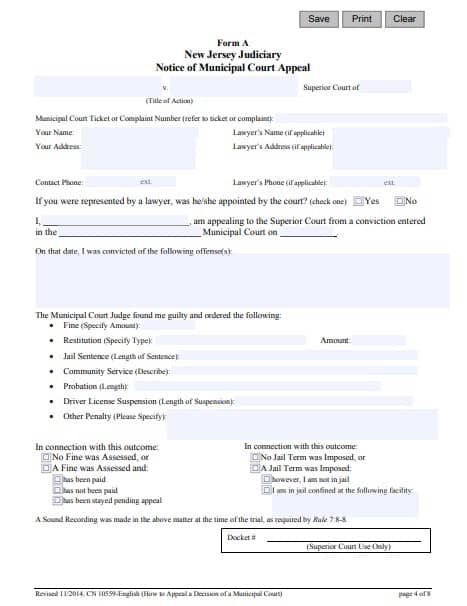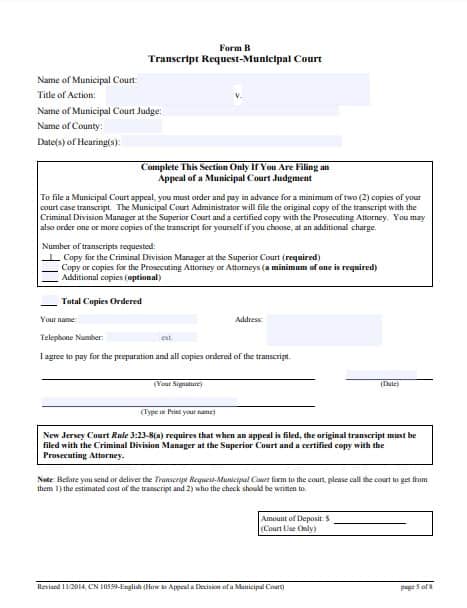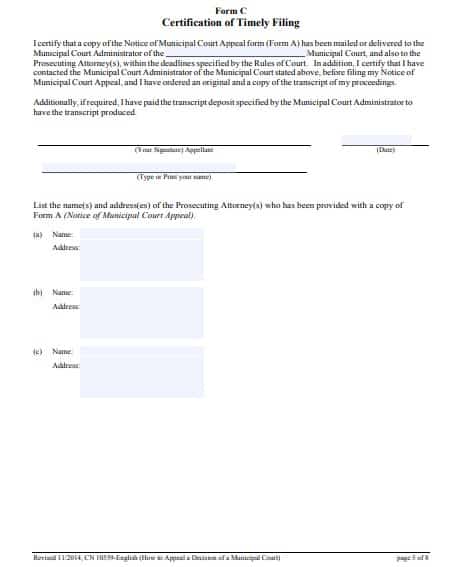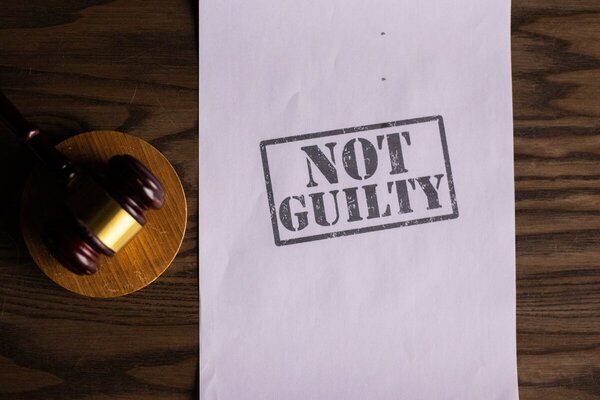People in New Jersey who think they were given the wrong ticket have the right to Plead Not Guilty contest their traffic charge. A valid complaint can be brought to court, where the judge will decide if the case is valid. If you’re charged with a driving violation, it’s important to know when you can file a challenge and how to go about doing so.
There are ways to review traffic ticket decisions in New Jersey, and the law spells out what might happen after a local court makes a decision. Anyone who is facing a traffic violation charge and wants to file an appeal needs to know about these steps. If you know what to do from entering a plea to possibly filing an appeal, you can change the result of your fines, points, and driving record.
Contents
NJ Traffic Infraction Contestability Assessment
How to fight a traffic violation in New Jersey NJMCDirect depends on the type of offense. For example, failure to keep right, driving carelessly, or not yielding to emergency vehicles are all examples of minor crimes. It is possible to successfully challenge these offenses without a lawyer because they are usually minor, and the person accused can explain their situation directly to the court.
Should you be accused of more serious crimes, like driving while drunk or leaving the scene of an accident, you should seriously consider hiring a defense lawyer. Without a lawyer, fighting these important charges could result in harsh punishments like heavy fines, license suspension, or even jail time.
Getting a ticket let’s you say “not guilty” at first, which will lead to an arraignment where you will officially tell the judge your plea. All parties in a trial—the prosecutor, the defense lawyer, and the defendant—will have a chance to show proof, call witnesses, and give testimony. The prosecutor has to prove beyond a reasonable doubt that the suspect is guilty.
Attorneys can help you with discovery, learning your rights, navigating pre-trial meetings, and coming up with a strong case. Additionally, if necessary, your lawyer can also try to get the charges or bail lowered. Before you get points on your license, you need to carefully consider the benefits of settling the charges or reducing the penalties. Getting legal help may be more beneficial than trying to defend yourself in court, especially in situations that are really complicated.
Plead Not Guilty for Traffic Tickets
Opting to challenge a traffic ticket rather than conceding culpability can grant individuals the opportunity to contest the charge in a municipal court. Individuals are expected to appear in court on the date specified on the ticket to express their intent to dispute the allegations.
Key Steps Before Pleading Not Guilty:
- Alert the relevant court within a few days after receiving the violation or directly contact the municipal court handling your case.
- A court clerk will instruct you to attend a court session on a scheduled date or coordinate a hearing for your case.
Before opting for a not guilty stance, individuals must evaluate several aspects:
- Evidence and Presentation: Ensure the possession of substantial proof and the capability to present such evidence effectively in court.
- License Points: Consider the likelihood of conviction adding points to your driver’s license, which could escalate to license suspension.
- Court Appearances: Confirm availability for potential multiple appearances in court.
- Severity of the Offense: Reflect on whether the conviction has the potential to result in incarceration, typically dependent on the gravity of the traffic offense.
Should individuals feel prepared to confront these considerations, they may proceed to challenge their traffic citations. Here’s how to navigate the process:
- Engage in discussions with the state prosecutor to negotiate a plea agreement, which could mean accepting a guilty plea in exchange for a lesser penalty. It’s crucial to recognize the implications this would have on your case.
- If an agreement is not reached, the case will go before a judge, and there may be a deferral if legal representation is necessary.
- Courts may allot a public defender if the offense could entail incarceration, or if the individual cannot afford legal counsel.
- Present all evidence and witness testimony to the court.
- The judge will deliberate on the presented evidence, arguments, and witness accounts to reach a decision.
The ruling could yield various consequences, and understanding the full scope of these outcomes is essential for anyone contemplating a not guilty plea.
When facing charges for reckless driving, the decision to fight the ticket increases in complexity due to its severity. Additionally, if eligible for traffic school, individuals should weigh this option as it may offer a means to mitigate the charges and avoid points on their license.
Outcomes After Traffic Court Decisions
Ramifications of Being Exonerated
When a defendant is exonerated in traffic court, several immediate effects follow:
- Dismissal of charges.
- No financial penalties or threat of license suspension.
- Insurance rates remain unchanged.
- Their driving record accrues no additional points.
Consequences of a Conviction
A conviction for a traffic infringement can lead to several penalties:
- Potential incarceration, dependent on the offense severity.
- An increase in points on the driver’s record.
- Revocation of driving privileges.
- Assignment to community service.
- Mandatory participation in New Jersey’s driver rehabilitation program.
- Monetary fines, with options for full payment on the judgment day or payment plans.
Important Note: Commercial Driver’s License holders must notify their employers of any traffic offenses within 30 days of conviction.
In the event of dissatisfaction with the judgment, defendants have the option to challenge the decision:
- Filing an appeal within a stipulated 20-day period post-verdict is necessary.
- The appeal is reviewed by a judge at New Jersey’s Supreme Court, considering the evidence from the initial trial.
- A final decision will then be rendered.
Be aware that the appeal process incurs a filing fee of $100, along with additional expenses for transcript preparation.
To manage the fallout from a traffic court verdict, individuals may find resources such as Pay NJ Traffic Ticket and vehicle registration in New Jersey helpful and can find additional information on managing surcharges at www.njsurcharge.com.
Appeal Traffic Ticket Verdict in New Jersey
Initiating the Appeal Process
To contest the outcome of a traffic ticket verdict in New Jersey, an individual must start by completing and submitting the following documents:
- Notice of Municipal Court Appeal (Form A): This form commences the appeal process. It must be filed with the original Municipal Court.

- Transcript Request Form (Form B): To obtain a written record of the hearing, request an original and a copy of the transcript from the Municipal Court.

Strict Deadlines
An essential aspect of the appeal is the adherence to strict deadlines:
- The Notice of Municipal Court Appeal (Form A) must be delivered to the Municipal Court within 20 days of the guilty verdict, which includes weekends and holidays.
- A copy of Form A should be sent to the prosecutor within five days of the initial submission to the Municipal Court.
Additional Documentation
- Fill and submit the Certification of Timely Filing (Form C), which verifies the timely submission of the required documents.

- A copy of Form A along with the original Form C must be sent to the Criminal Division Manager at the Superior Court within five days of mailing Form A.
Financial Considerations
- The process requires a $100 filing fee, payable via money order or check to the New Jersey Treasurer at the Criminal Division Manager’s office. For those unable to afford the fee, assistance is available to apply for a waiver.
Legal Representation
Deciding on legal representation is the last step in preparing for the appeal. Options include:
- Seeking assistance from the New Jersey Attorney Referral Office.
- Reaching out to local or state Bar Associations for recommendations of attorneys who offer reasonable rates.
Preparation Checklist
Creating a checklist of these steps can be beneficial for ensuring each part of the process is completed correctly, enhancing the chances of a successful appeal.
As one approaches the final hearing, thorough preparation and understanding of the process are paramount in seeking a favorable outcome.
